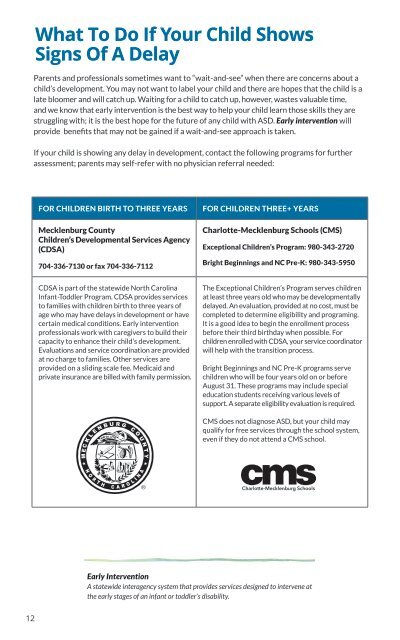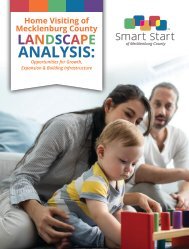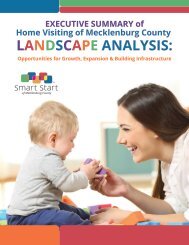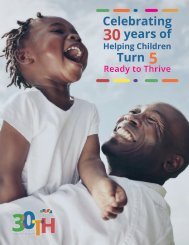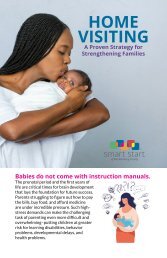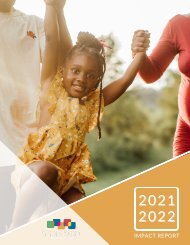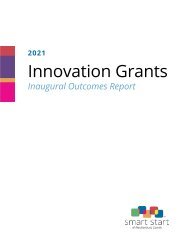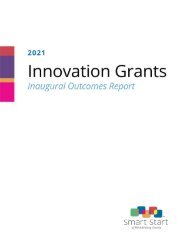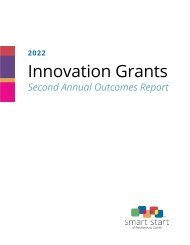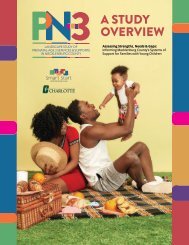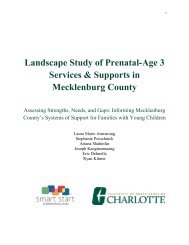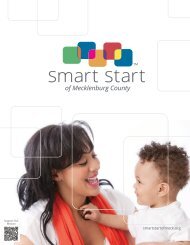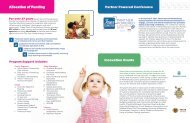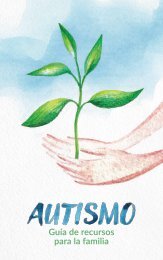Autism Family Resource Guidebook
Guiding Parents to Services (GPS), is pleased to share the new Autism Family Resource Guide. GPS is a funded program of Smart Start of Mecklenburg County. This publication serves as a guide for parents with children ages birth to five as they navigate the world of autism. For more information regarding the publication or the program, please reach out to the Autism Coordinator of Guiding Parents to Services at gps@smartstartofmeck.org. Autism Family Resource Guidebook for Mecklenburg County, North Carolina. ©2021
Guiding Parents to Services (GPS), is pleased to share the new Autism Family Resource Guide. GPS is a funded program of Smart Start of Mecklenburg County. This publication serves as a guide for parents with children ages birth to five as they navigate the world of autism. For more information regarding the publication or the program, please reach out to the Autism Coordinator of Guiding Parents to Services at gps@smartstartofmeck.org.
Autism Family Resource Guidebook for Mecklenburg County, North Carolina. ©2021
Create successful ePaper yourself
Turn your PDF publications into a flip-book with our unique Google optimized e-Paper software.
Is My Child Developing<br />
Appropriately?<br />
What To Do If Your Child Shows<br />
Signs Of A Delay<br />
In the tables below, developmental milestones are listed for children with typical development,<br />
alongside Parents and behaviors professionals that may sometimes be signs want of autism to “wait-and-see” spectrum disorders when (ASD). there Learning are concerns about a<br />
developmental child’s development. milestones You may can not help want parents to label know your what child to and expect there from are their hopes children. that the child is a<br />
late bloomer and will catch up. Waiting for a child to catch up, however, wastes valuable time,<br />
While and we looking know that observable early intervention behaviors, is the please best keep way to in help mind your that child development learn those is individual skills they are and<br />
these struggling are the with; approximate it is the best age hope ranges for the to observe future of the any expected child with behaviors ASD. Early for intervention all children. Every will<br />
child provide is different, benefits even that among may not siblings. be gained Your if child’s a wait-and-see environment, approach family is and taken. experiences contribute<br />
to their development. If you are concerned, please talk to your child’s pediatrician as soon as<br />
possible. If your child The is earlier showing concerns any delay are in addressed, development, the better contact the the long-term following prognosis programs is for for further<br />
child,<br />
whether assessment; the delay parents is indeed may self-refer autism or with something no physician else. referral needed:<br />
It may be upseting or scary to discover<br />
a Questions delay in development. About Getting<br />
A Diagnosis<br />
Deep breath... you can do this.<br />
By now you have determined that your child has a delay, and maybe you or your team have<br />
concerns about ASD. The next step is getting an actual diagnosis. Remember, your child is still<br />
the same little one that you loved before you started this journey... nothing has changed.<br />
Receiving a diagnosis allows you to work toward getting the help your child needs; it is a way<br />
to obtain more knowledge and support.<br />
What are the differences between a screening,<br />
an eligibility assessment and a formal diagnosis?<br />
FOR CHILDREN BIRTH TO THREE YEARS<br />
FOR CHILDREN THREE+ YEARS<br />
Screenings usually occur in a doctor’s office and are the first step. They provide a quick and<br />
simple way to monitor a child’s healthy development. Monitoring includes clinical observations<br />
and the charting of developmental milestones.<br />
Mecklenburg County<br />
Charlotte-Mecklenburg Schools (CMS)<br />
If concerns about your child are raised by a developmental screening, further screenings for<br />
Children’s Developmental Services Agency<br />
hearing loss or lead poisoning, or the M-CHAT (a screening for ASD) may be completed. If<br />
(CDSA)<br />
Exceptional Children’s Program: 980-343-2720<br />
screening results suggest that your child has signs of ASD, the next steps are to seek services<br />
704-336-7130 or fax 704-336-7112<br />
Bright Beginnings and NC Pre-K: 980-343-5950<br />
and/or a diagnosis.<br />
Red Flags for <strong>Autism</strong><br />
Red Flags for <strong>Autism</strong><br />
UNDER 12 MONTHS Typical Development<br />
12-24 MONTHS Typical Development<br />
Spectrum Disorder (ASD)<br />
Eligibility assessments are conducted by the CDSA and CMS for Spectrum the purpose Disorder of establishing (ASD)<br />
CDSA is part of the statewide North Carolina The Exceptional Children’s Program serves children<br />
Infant-Toddler Program. CDSA provides services at least three years old who may be developmentally<br />
eligibility for specialized services and are based on federal legislation, The Individuals with<br />
Social Interaction • Babbling or coos and smiles in<br />
• Tends not to turn to someone<br />
to families with children birth to three years of delayed. An evaluation, provided at no cost, must be<br />
Social Disabilities Interaction Education Improvement • Pretend play by Act using (IDEIA). gestures, Part C of the • IDEIA Lack of targets imitation infants and toddlers,<br />
response<br />
calling their name and seems not<br />
words and new actions<br />
age who may have delays in development or have completed to determine eligibility and programing.<br />
and Part B targets school-aged children (which may include 3- • and Poor 4-year emotional old modulation<br />
to hear or be interested; seems to<br />
children). CMS’s<br />
certain medical conditions. • Early Turns intervention<br />
head and pays attention It is a good idea to begin the enrollment process<br />
• Stays active and engaged during<br />
hear environmental sounds better<br />
evaluation team will consider whether your child’s symptoms adversely affects their educational<br />
professionals work with caregivers towards to sounds build their and voices before where their third birthday when possible. For<br />
activities and monitors what you are<br />
than human voices<br />
performance and whether paying specialized attention educational to<br />
services are appropriate. A child may be<br />
capacity to enhance their child’s you are development.<br />
looking and pointing children enrolled with CDSA, your service coordinator<br />
Evaluations and service coordination eligible for services through • Talks the with CDSA you about or CMS a topic without he/she having a diagnosis of autism.<br />
• Shows interest<br />
are provided<br />
in faces<br />
will help with the • transition Fails to look process. where someone is<br />
at no charge to families. Other services are<br />
pointing<br />
is interested in, tells about his/her<br />
feelings and asks questions<br />
provided on a sliding scale fee. Medicaid and<br />
Bright Beginnings • Absent and NC facial Pre-K expression, programs serve such as<br />
Formal diagnoses of ASD are most often made through assessments conducted in the private<br />
private insurance are billed with family permission. children who will be • Can have short reciprocal<br />
decreased four years smiling old on or or upset/scared<br />
before<br />
sector by a psychologist, conversation psychiatrist, (back neurologist and forth) or physician using specific criteria. While CDSA<br />
August 31. These programs face may include special<br />
does have staff qualified to make a diagnosis, the public school system cannot make a formal<br />
education students receiving various levels of<br />
Communication<br />
diagnosis of ASD. • Combines sounds, gestures and<br />
• Rarely/never points<br />
Communication<br />
• Cries differently for different support. needs A separate • Delayed eligibility and evaluation infrequent is required. sounds<br />
words to tell what he/she is thinking<br />
(e.g. hungry vs. tired)<br />
of speech<br />
• Absent or unusual use of gestures,<br />
CMS does not diagnose ASD, but your child may<br />
• Starts to imitate new simple words expression, or vocal quality to<br />
• Makes eye contact and maintains qualify for for free services • Limited through eye contact the school and may system, not<br />
Why would I seek & actions a diagnosis for my child?<br />
communicate<br />
moving objects (even for a<br />
even<br />
short<br />
if<br />
time)<br />
they do not<br />
look<br />
attend<br />
where<br />
a CMS<br />
another<br />
school.<br />
is looking<br />
• Uses words to name objects, pictures, • Delayed speech<br />
• Responds to “no” and simple directions • Does not wave bye-bye<br />
There are some good reasons people, for animals getting and a starts diagnosis. to combine A thorough • Early and signs detailed of developmental diagnosis... regression<br />
(e.g. “Come here”) and says one or<br />
two words to convey different<br />
• will provide important meanings<br />
two words<br />
information and answers to your questions about your child’s<br />
behavior and development. • Understands simple pronouns<br />
(me, you, my)<br />
Behavior/Interests • Join to sound/rhythm by making or • Attending to unusual objects or<br />
repeating sounds<br />
patterns<br />
• will create a road map for treatment by identifying your child’s specific strengths and<br />
Behavior/Interests • Join to sound and rhythm plays by • Play routines are limited to a single<br />
• Explores different toys and/objects • Over- or under-reactions to<br />
challenges and providing useful information about which needs and skills should be<br />
making or repeating sounds<br />
action or are imitations always<br />
with fingers and mouth<br />
stimulation<br />
targeted for effective intervention.<br />
• Explores different toys and/objects completed in the same way<br />
• Show physical reaction when excited • Repeats a movement or routine<br />
with fingers and mouth (getting ready • Does not demonstrate joint attention<br />
• may be required for insurance for picking coverage a favorite of toy certain while services.<br />
over and over<br />
playing with others too)<br />
It can be frightening to • think Show about physical “labeling” reaction when your excited child, but remember that a label does not limit.<br />
It does not determine outcomes. It does not change who your child is. However, a label can help<br />
Other your child receive services • Has and a regular accommodations sleep schedule<br />
<strong>Autism</strong> Spectrum Disorder<br />
that are appropriate for the unique pattern of<br />
Early Intervention<br />
<strong>Autism</strong> is a neurodevelopmental disorder defined by persistent deficits social<br />
their development. • Eats an increasing variety of foods<br />
A statewide interagency system that provides services designed to intervene at<br />
communication the early stages of and an social infant interaction, or toddler’s accompanied disability. by restricted, repetitive<br />
6 patterns of behavior, interests, or activities.<br />
7<br />
12<br />
13


